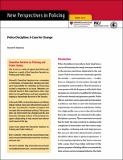| dc.description.abstract |
Law enforcement officials, police personnel, and the general public have long been frustrated by the extensive and involved process in dealing with police discipline. Police executives are often upset that a case that has taken months and sometimes years to resolve may be overturned through the actions of arbitrators, civil service boards, or grievance panels. Police officers are often upset over the seeming lack of fairness and consistency in police discipline cases, while the general public is dismayed by the time it takes to investigate and close a case. This paper examines the issues surrounding the police discipline process. This paper has three main sections that focus on issues related to the discipline process and the primary purposes behind the process. The first section discusses law enforcement officials’ task of creating an environment where officers understand what is expected of them and behave in a manner that will allow them to avoid the disciplinary process altogether. The second section reviews issues associated with the traditional approaches to police discipline and discusses new and different approached being tried by police departments around the country. The final section offers recommendations for ways to implement more effective and efficient approaches to police discipline. |

